Business Proposal: Solar Energy Installation in Lagos, Nigeria
VerifiedAdded on 2023/04/21
|7
|1470
|338
Project
AI Summary
This project presents a comprehensive business proposal for Pekfields solar panel installation Company, focusing on establishing operations in Lagos, Nigeria. The proposal begins with an executive summary and table of contents, followed by an introduction that provides industry and company background, emphasizing the need for renewable energy sources and the potential of solar energy in Nigeria. It identifies business opportunities, such as reduced electricity bills and environmental benefits, while also addressing potential issues like land and water usage. The project defines the purpose and rationale for the study, setting out research questions concerning the impact of solar energy installation, factors affecting business growth, and recommendations for improvement. The research framework outlines the structure of the project, detailing the chapters that cover business review, research design, data analysis, and conclusions with recommendations. The business review analyzes factors impacting the industry. The research design explains the methods used, collection methods, and ethical considerations. Data analysis presents case findings and business implications. The final chapter provides the company's vision, mission, objectives, marketing, operational, and financial plans, along with an implementation schedule and risk mitigation strategies, all supported by relevant references. The goal is to present a detailed plan for a solar energy installation company, aligning with the assignment brief's requirements.
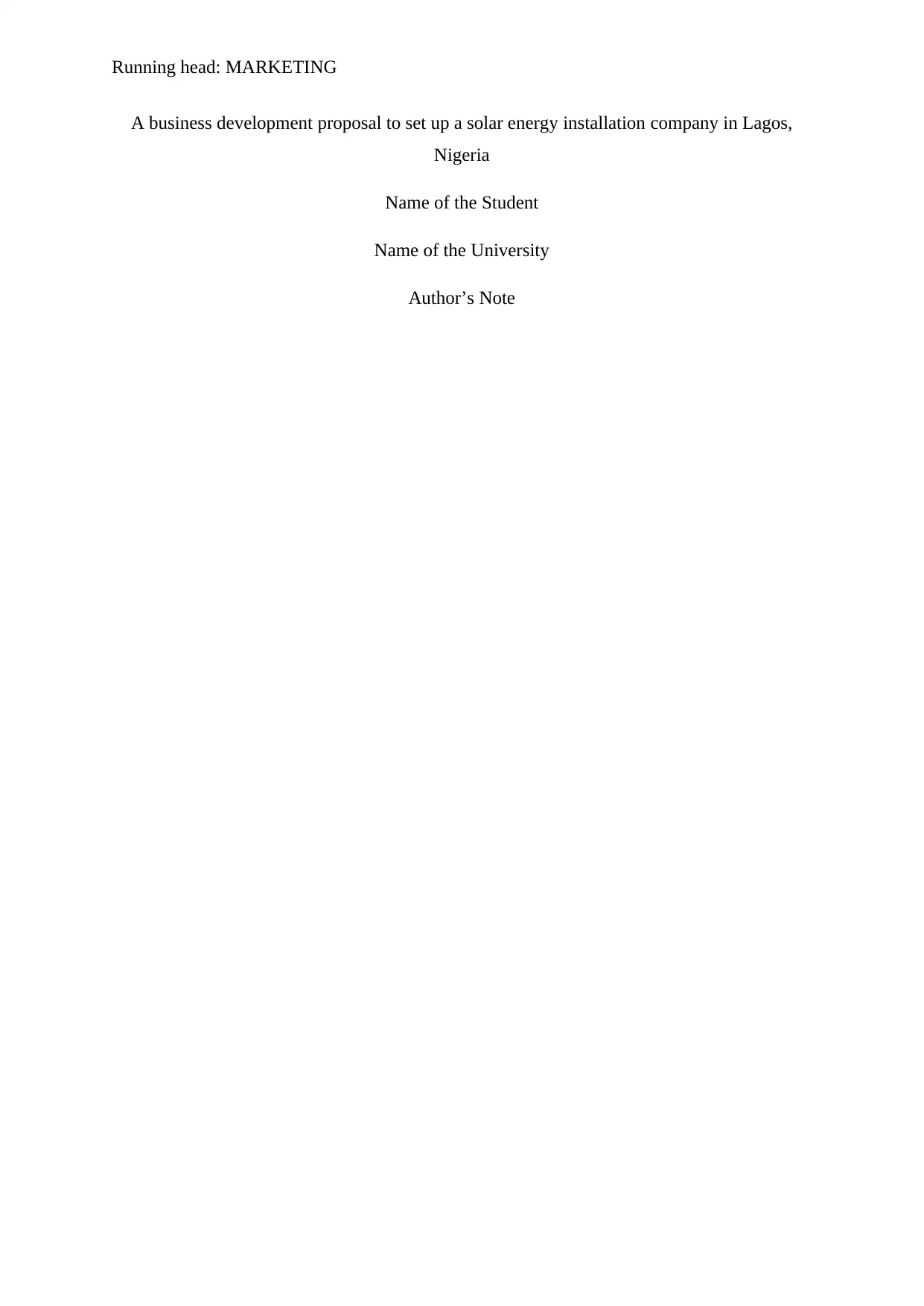
Running head: MARKETING
A business development proposal to set up a solar energy installation company in Lagos,
Nigeria
Name of the Student
Name of the University
Author’s Note
A business development proposal to set up a solar energy installation company in Lagos,
Nigeria
Name of the Student
Name of the University
Author’s Note
Paraphrase This Document
Need a fresh take? Get an instant paraphrase of this document with our AI Paraphraser
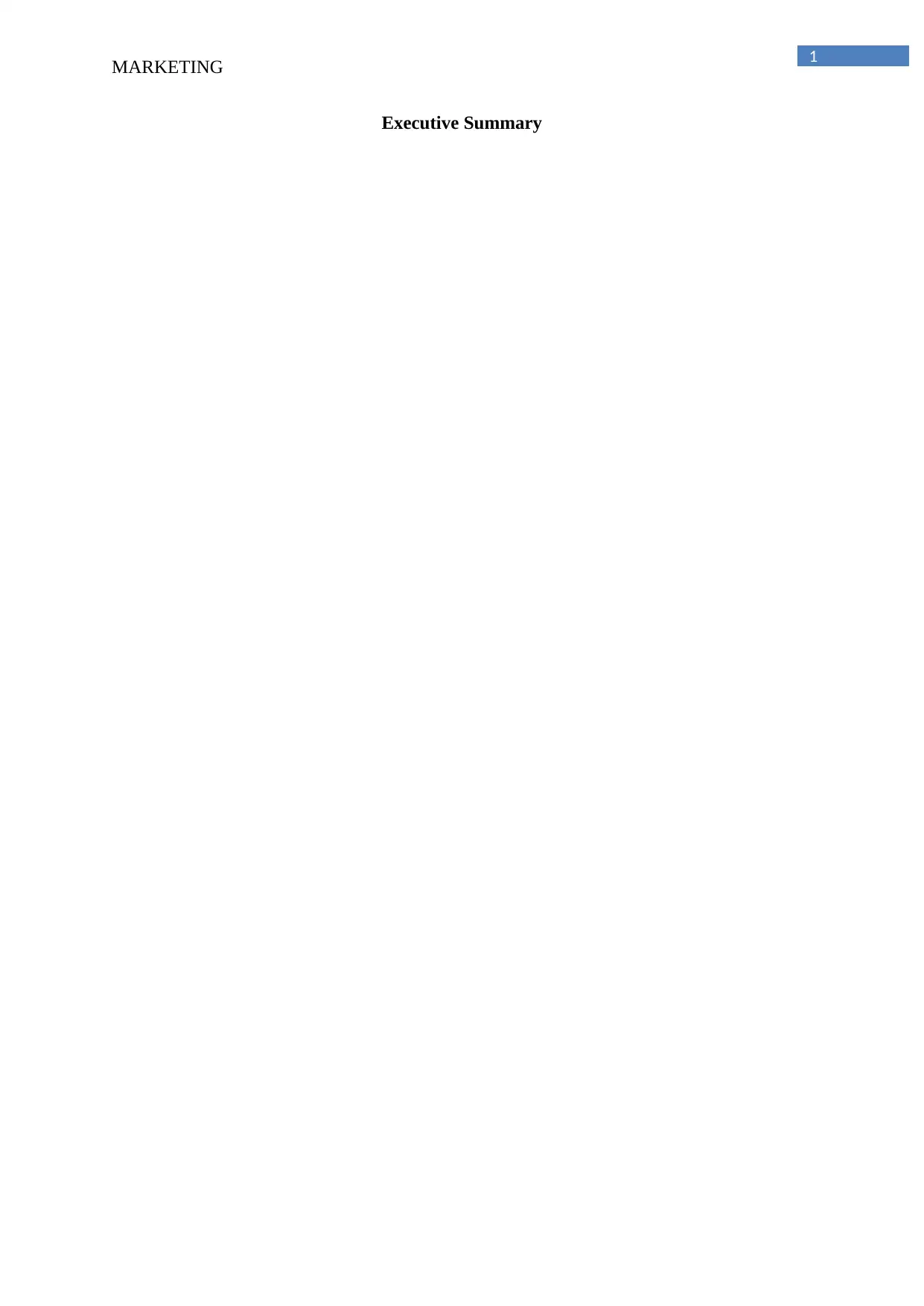
1
MARKETING
Executive Summary
MARKETING
Executive Summary
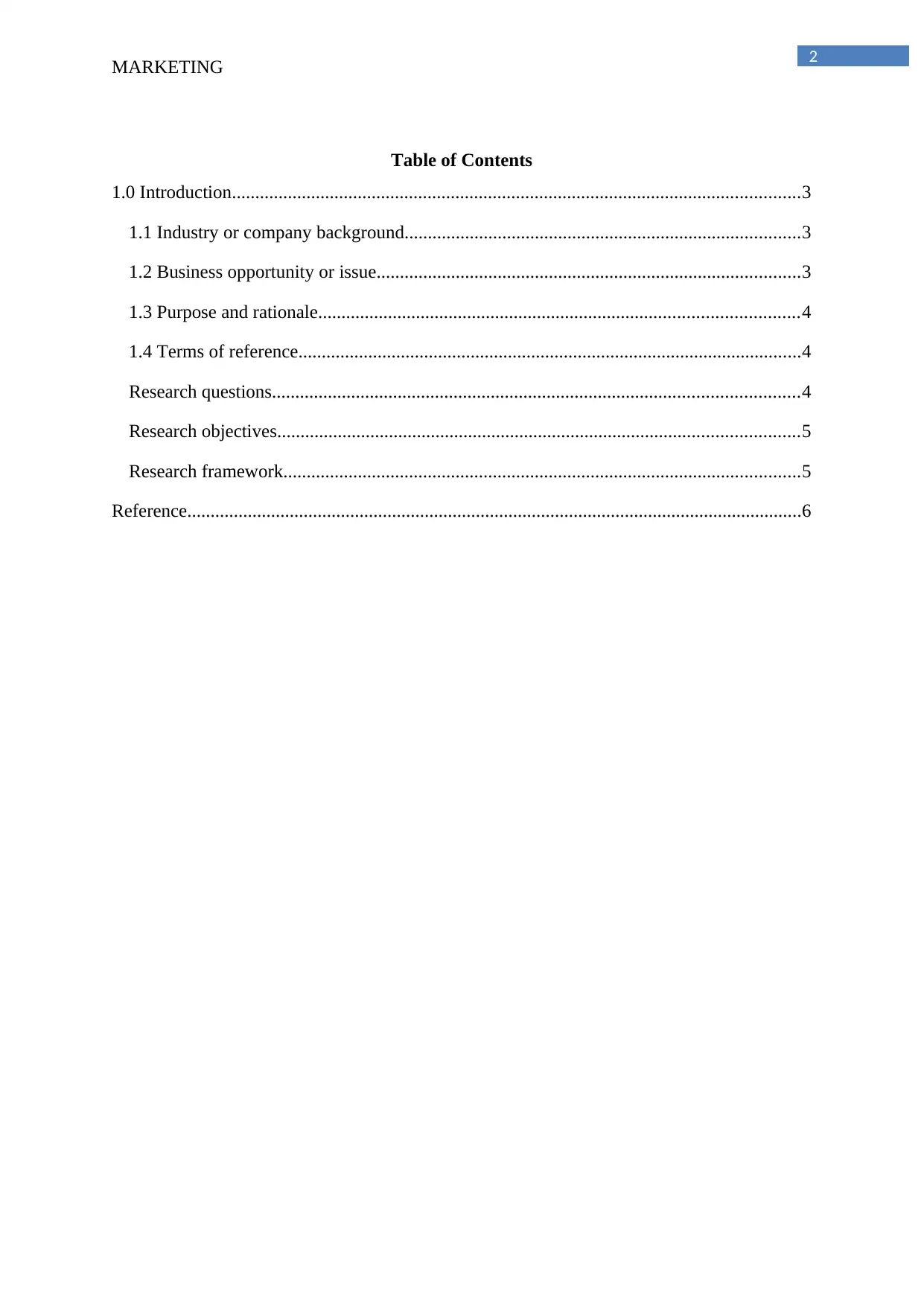
2
MARKETING
Table of Contents
1.0 Introduction..........................................................................................................................3
1.1 Industry or company background.....................................................................................3
1.2 Business opportunity or issue...........................................................................................3
1.3 Purpose and rationale.......................................................................................................4
1.4 Terms of reference............................................................................................................4
Research questions.................................................................................................................4
Research objectives................................................................................................................5
Research framework...............................................................................................................5
Reference....................................................................................................................................6
MARKETING
Table of Contents
1.0 Introduction..........................................................................................................................3
1.1 Industry or company background.....................................................................................3
1.2 Business opportunity or issue...........................................................................................3
1.3 Purpose and rationale.......................................................................................................4
1.4 Terms of reference............................................................................................................4
Research questions.................................................................................................................4
Research objectives................................................................................................................5
Research framework...............................................................................................................5
Reference....................................................................................................................................6
⊘ This is a preview!⊘
Do you want full access?
Subscribe today to unlock all pages.

Trusted by 1+ million students worldwide
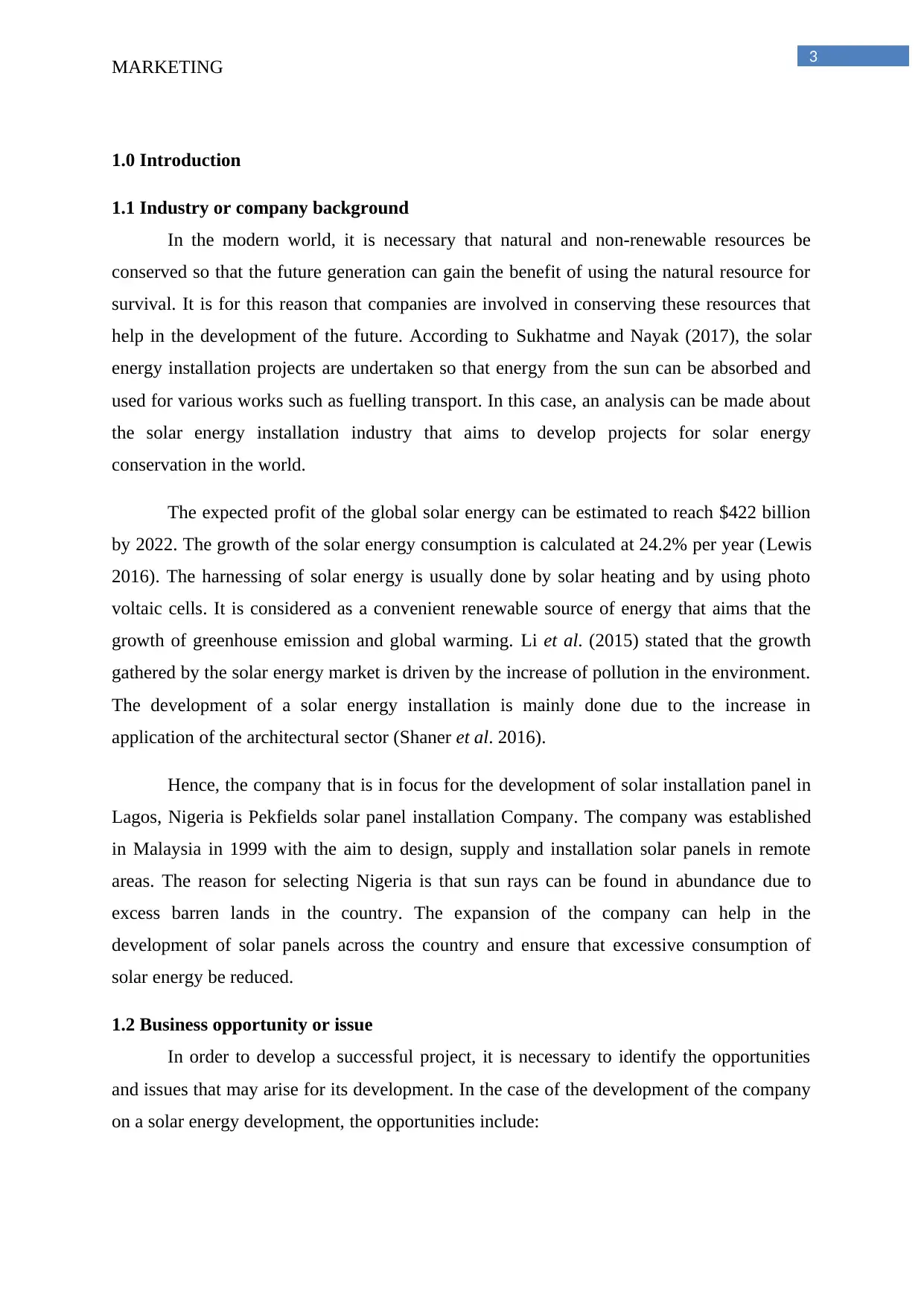
3
MARKETING
1.0 Introduction
1.1 Industry or company background
In the modern world, it is necessary that natural and non-renewable resources be
conserved so that the future generation can gain the benefit of using the natural resource for
survival. It is for this reason that companies are involved in conserving these resources that
help in the development of the future. According to Sukhatme and Nayak (2017), the solar
energy installation projects are undertaken so that energy from the sun can be absorbed and
used for various works such as fuelling transport. In this case, an analysis can be made about
the solar energy installation industry that aims to develop projects for solar energy
conservation in the world.
The expected profit of the global solar energy can be estimated to reach $422 billion
by 2022. The growth of the solar energy consumption is calculated at 24.2% per year (Lewis
2016). The harnessing of solar energy is usually done by solar heating and by using photo
voltaic cells. It is considered as a convenient renewable source of energy that aims that the
growth of greenhouse emission and global warming. Li et al. (2015) stated that the growth
gathered by the solar energy market is driven by the increase of pollution in the environment.
The development of a solar energy installation is mainly done due to the increase in
application of the architectural sector (Shaner et al. 2016).
Hence, the company that is in focus for the development of solar installation panel in
Lagos, Nigeria is Pekfields solar panel installation Company. The company was established
in Malaysia in 1999 with the aim to design, supply and installation solar panels in remote
areas. The reason for selecting Nigeria is that sun rays can be found in abundance due to
excess barren lands in the country. The expansion of the company can help in the
development of solar panels across the country and ensure that excessive consumption of
solar energy be reduced.
1.2 Business opportunity or issue
In order to develop a successful project, it is necessary to identify the opportunities
and issues that may arise for its development. In the case of the development of the company
on a solar energy development, the opportunities include:
MARKETING
1.0 Introduction
1.1 Industry or company background
In the modern world, it is necessary that natural and non-renewable resources be
conserved so that the future generation can gain the benefit of using the natural resource for
survival. It is for this reason that companies are involved in conserving these resources that
help in the development of the future. According to Sukhatme and Nayak (2017), the solar
energy installation projects are undertaken so that energy from the sun can be absorbed and
used for various works such as fuelling transport. In this case, an analysis can be made about
the solar energy installation industry that aims to develop projects for solar energy
conservation in the world.
The expected profit of the global solar energy can be estimated to reach $422 billion
by 2022. The growth of the solar energy consumption is calculated at 24.2% per year (Lewis
2016). The harnessing of solar energy is usually done by solar heating and by using photo
voltaic cells. It is considered as a convenient renewable source of energy that aims that the
growth of greenhouse emission and global warming. Li et al. (2015) stated that the growth
gathered by the solar energy market is driven by the increase of pollution in the environment.
The development of a solar energy installation is mainly done due to the increase in
application of the architectural sector (Shaner et al. 2016).
Hence, the company that is in focus for the development of solar installation panel in
Lagos, Nigeria is Pekfields solar panel installation Company. The company was established
in Malaysia in 1999 with the aim to design, supply and installation solar panels in remote
areas. The reason for selecting Nigeria is that sun rays can be found in abundance due to
excess barren lands in the country. The expansion of the company can help in the
development of solar panels across the country and ensure that excessive consumption of
solar energy be reduced.
1.2 Business opportunity or issue
In order to develop a successful project, it is necessary to identify the opportunities
and issues that may arise for its development. In the case of the development of the company
on a solar energy development, the opportunities include:
Paraphrase This Document
Need a fresh take? Get an instant paraphrase of this document with our AI Paraphraser
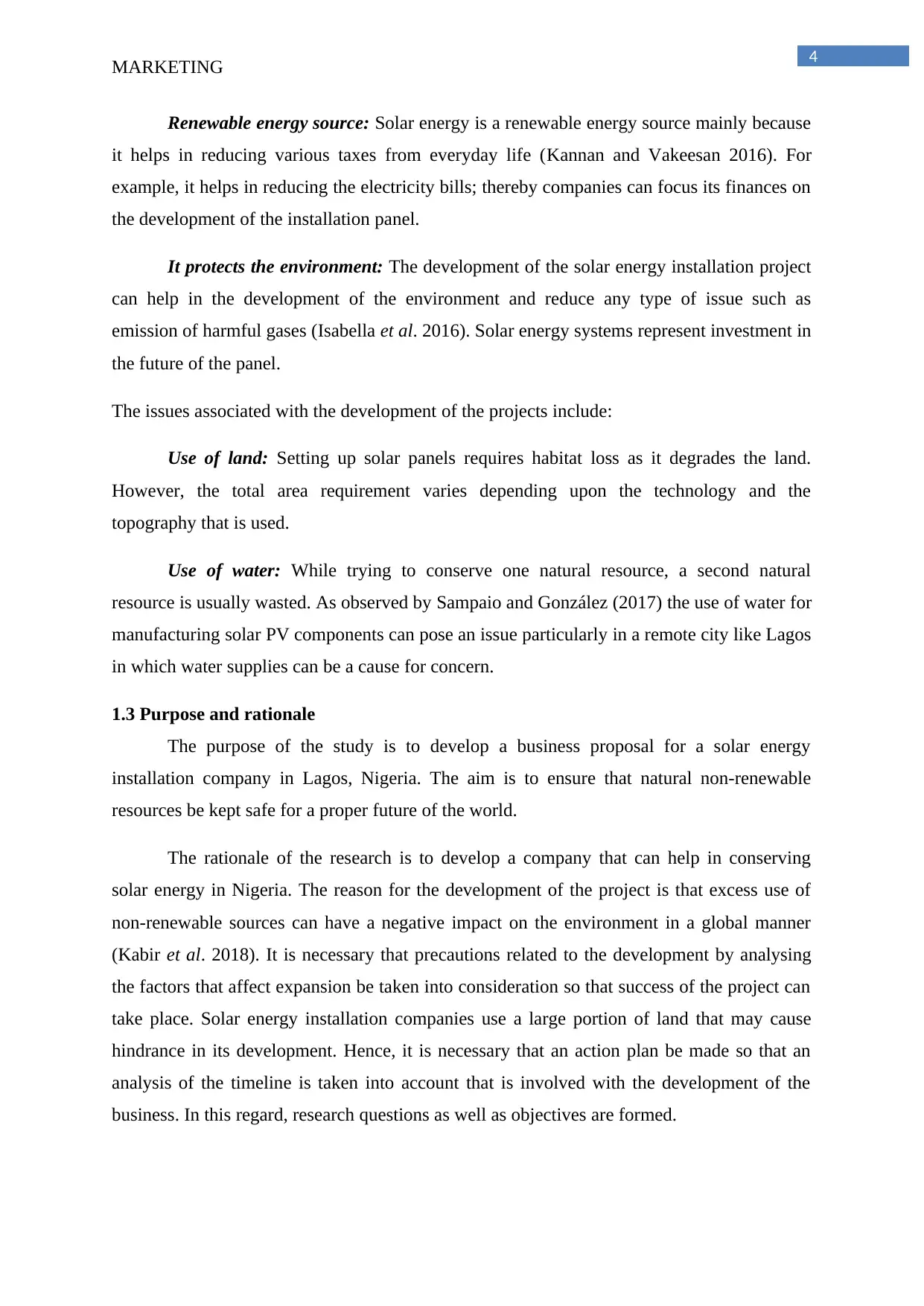
4
MARKETING
Renewable energy source: Solar energy is a renewable energy source mainly because
it helps in reducing various taxes from everyday life (Kannan and Vakeesan 2016). For
example, it helps in reducing the electricity bills; thereby companies can focus its finances on
the development of the installation panel.
It protects the environment: The development of the solar energy installation project
can help in the development of the environment and reduce any type of issue such as
emission of harmful gases (Isabella et al. 2016). Solar energy systems represent investment in
the future of the panel.
The issues associated with the development of the projects include:
Use of land: Setting up solar panels requires habitat loss as it degrades the land.
However, the total area requirement varies depending upon the technology and the
topography that is used.
Use of water: While trying to conserve one natural resource, a second natural
resource is usually wasted. As observed by Sampaio and González (2017) the use of water for
manufacturing solar PV components can pose an issue particularly in a remote city like Lagos
in which water supplies can be a cause for concern.
1.3 Purpose and rationale
The purpose of the study is to develop a business proposal for a solar energy
installation company in Lagos, Nigeria. The aim is to ensure that natural non-renewable
resources be kept safe for a proper future of the world.
The rationale of the research is to develop a company that can help in conserving
solar energy in Nigeria. The reason for the development of the project is that excess use of
non-renewable sources can have a negative impact on the environment in a global manner
(Kabir et al. 2018). It is necessary that precautions related to the development by analysing
the factors that affect expansion be taken into consideration so that success of the project can
take place. Solar energy installation companies use a large portion of land that may cause
hindrance in its development. Hence, it is necessary that an action plan be made so that an
analysis of the timeline is taken into account that is involved with the development of the
business. In this regard, research questions as well as objectives are formed.
MARKETING
Renewable energy source: Solar energy is a renewable energy source mainly because
it helps in reducing various taxes from everyday life (Kannan and Vakeesan 2016). For
example, it helps in reducing the electricity bills; thereby companies can focus its finances on
the development of the installation panel.
It protects the environment: The development of the solar energy installation project
can help in the development of the environment and reduce any type of issue such as
emission of harmful gases (Isabella et al. 2016). Solar energy systems represent investment in
the future of the panel.
The issues associated with the development of the projects include:
Use of land: Setting up solar panels requires habitat loss as it degrades the land.
However, the total area requirement varies depending upon the technology and the
topography that is used.
Use of water: While trying to conserve one natural resource, a second natural
resource is usually wasted. As observed by Sampaio and González (2017) the use of water for
manufacturing solar PV components can pose an issue particularly in a remote city like Lagos
in which water supplies can be a cause for concern.
1.3 Purpose and rationale
The purpose of the study is to develop a business proposal for a solar energy
installation company in Lagos, Nigeria. The aim is to ensure that natural non-renewable
resources be kept safe for a proper future of the world.
The rationale of the research is to develop a company that can help in conserving
solar energy in Nigeria. The reason for the development of the project is that excess use of
non-renewable sources can have a negative impact on the environment in a global manner
(Kabir et al. 2018). It is necessary that precautions related to the development by analysing
the factors that affect expansion be taken into consideration so that success of the project can
take place. Solar energy installation companies use a large portion of land that may cause
hindrance in its development. Hence, it is necessary that an action plan be made so that an
analysis of the timeline is taken into account that is involved with the development of the
business. In this regard, research questions as well as objectives are formed.
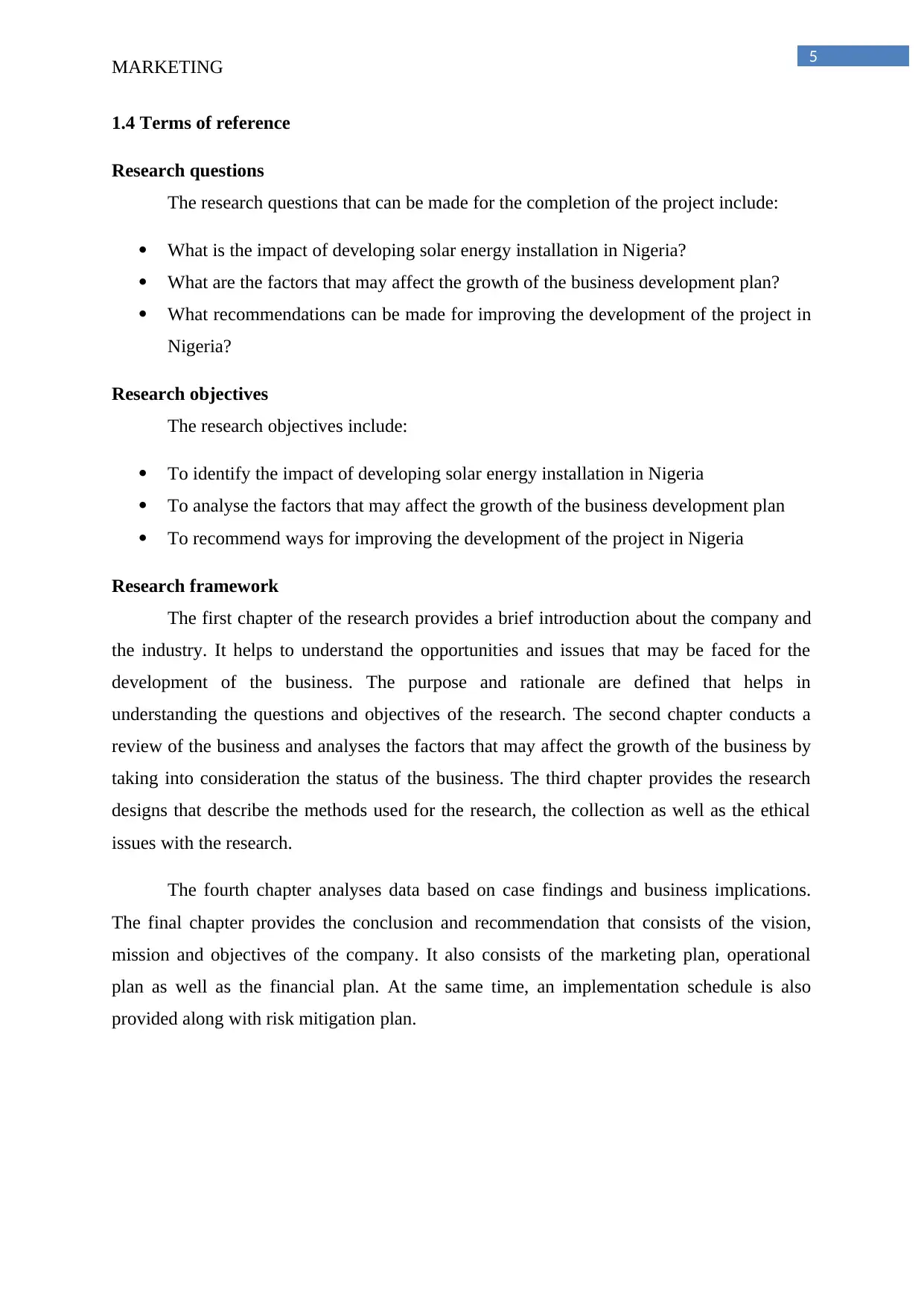
5
MARKETING
1.4 Terms of reference
Research questions
The research questions that can be made for the completion of the project include:
What is the impact of developing solar energy installation in Nigeria?
What are the factors that may affect the growth of the business development plan?
What recommendations can be made for improving the development of the project in
Nigeria?
Research objectives
The research objectives include:
To identify the impact of developing solar energy installation in Nigeria
To analyse the factors that may affect the growth of the business development plan
To recommend ways for improving the development of the project in Nigeria
Research framework
The first chapter of the research provides a brief introduction about the company and
the industry. It helps to understand the opportunities and issues that may be faced for the
development of the business. The purpose and rationale are defined that helps in
understanding the questions and objectives of the research. The second chapter conducts a
review of the business and analyses the factors that may affect the growth of the business by
taking into consideration the status of the business. The third chapter provides the research
designs that describe the methods used for the research, the collection as well as the ethical
issues with the research.
The fourth chapter analyses data based on case findings and business implications.
The final chapter provides the conclusion and recommendation that consists of the vision,
mission and objectives of the company. It also consists of the marketing plan, operational
plan as well as the financial plan. At the same time, an implementation schedule is also
provided along with risk mitigation plan.
MARKETING
1.4 Terms of reference
Research questions
The research questions that can be made for the completion of the project include:
What is the impact of developing solar energy installation in Nigeria?
What are the factors that may affect the growth of the business development plan?
What recommendations can be made for improving the development of the project in
Nigeria?
Research objectives
The research objectives include:
To identify the impact of developing solar energy installation in Nigeria
To analyse the factors that may affect the growth of the business development plan
To recommend ways for improving the development of the project in Nigeria
Research framework
The first chapter of the research provides a brief introduction about the company and
the industry. It helps to understand the opportunities and issues that may be faced for the
development of the business. The purpose and rationale are defined that helps in
understanding the questions and objectives of the research. The second chapter conducts a
review of the business and analyses the factors that may affect the growth of the business by
taking into consideration the status of the business. The third chapter provides the research
designs that describe the methods used for the research, the collection as well as the ethical
issues with the research.
The fourth chapter analyses data based on case findings and business implications.
The final chapter provides the conclusion and recommendation that consists of the vision,
mission and objectives of the company. It also consists of the marketing plan, operational
plan as well as the financial plan. At the same time, an implementation schedule is also
provided along with risk mitigation plan.
⊘ This is a preview!⊘
Do you want full access?
Subscribe today to unlock all pages.

Trusted by 1+ million students worldwide
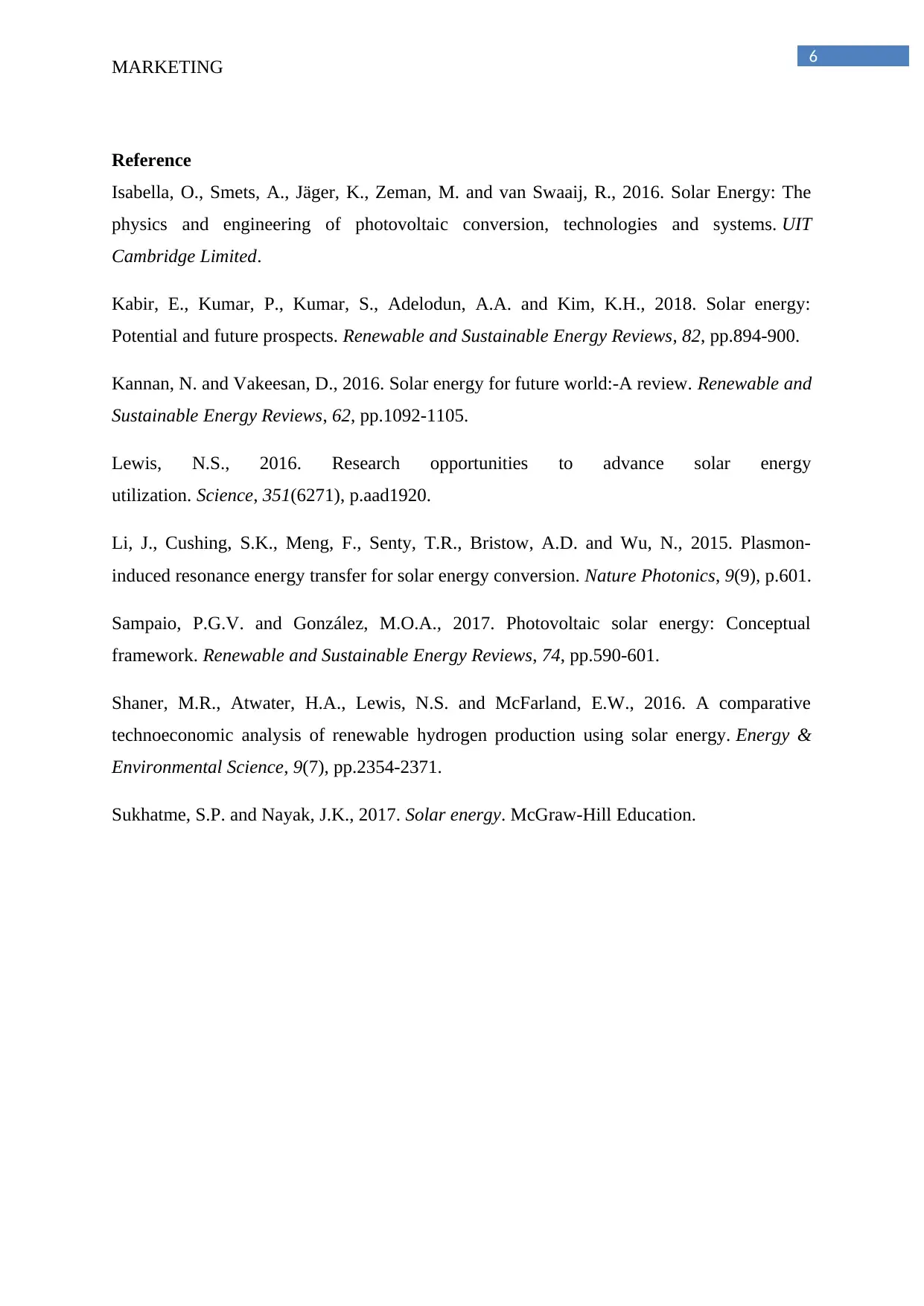
6
MARKETING
Reference
Isabella, O., Smets, A., Jäger, K., Zeman, M. and van Swaaij, R., 2016. Solar Energy: The
physics and engineering of photovoltaic conversion, technologies and systems. UIT
Cambridge Limited.
Kabir, E., Kumar, P., Kumar, S., Adelodun, A.A. and Kim, K.H., 2018. Solar energy:
Potential and future prospects. Renewable and Sustainable Energy Reviews, 82, pp.894-900.
Kannan, N. and Vakeesan, D., 2016. Solar energy for future world:-A review. Renewable and
Sustainable Energy Reviews, 62, pp.1092-1105.
Lewis, N.S., 2016. Research opportunities to advance solar energy
utilization. Science, 351(6271), p.aad1920.
Li, J., Cushing, S.K., Meng, F., Senty, T.R., Bristow, A.D. and Wu, N., 2015. Plasmon-
induced resonance energy transfer for solar energy conversion. Nature Photonics, 9(9), p.601.
Sampaio, P.G.V. and González, M.O.A., 2017. Photovoltaic solar energy: Conceptual
framework. Renewable and Sustainable Energy Reviews, 74, pp.590-601.
Shaner, M.R., Atwater, H.A., Lewis, N.S. and McFarland, E.W., 2016. A comparative
technoeconomic analysis of renewable hydrogen production using solar energy. Energy &
Environmental Science, 9(7), pp.2354-2371.
Sukhatme, S.P. and Nayak, J.K., 2017. Solar energy. McGraw-Hill Education.
MARKETING
Reference
Isabella, O., Smets, A., Jäger, K., Zeman, M. and van Swaaij, R., 2016. Solar Energy: The
physics and engineering of photovoltaic conversion, technologies and systems. UIT
Cambridge Limited.
Kabir, E., Kumar, P., Kumar, S., Adelodun, A.A. and Kim, K.H., 2018. Solar energy:
Potential and future prospects. Renewable and Sustainable Energy Reviews, 82, pp.894-900.
Kannan, N. and Vakeesan, D., 2016. Solar energy for future world:-A review. Renewable and
Sustainable Energy Reviews, 62, pp.1092-1105.
Lewis, N.S., 2016. Research opportunities to advance solar energy
utilization. Science, 351(6271), p.aad1920.
Li, J., Cushing, S.K., Meng, F., Senty, T.R., Bristow, A.D. and Wu, N., 2015. Plasmon-
induced resonance energy transfer for solar energy conversion. Nature Photonics, 9(9), p.601.
Sampaio, P.G.V. and González, M.O.A., 2017. Photovoltaic solar energy: Conceptual
framework. Renewable and Sustainable Energy Reviews, 74, pp.590-601.
Shaner, M.R., Atwater, H.A., Lewis, N.S. and McFarland, E.W., 2016. A comparative
technoeconomic analysis of renewable hydrogen production using solar energy. Energy &
Environmental Science, 9(7), pp.2354-2371.
Sukhatme, S.P. and Nayak, J.K., 2017. Solar energy. McGraw-Hill Education.
1 out of 7
Related Documents
Your All-in-One AI-Powered Toolkit for Academic Success.
+13062052269
info@desklib.com
Available 24*7 on WhatsApp / Email
![[object Object]](/_next/static/media/star-bottom.7253800d.svg)
Unlock your academic potential
Copyright © 2020–2025 A2Z Services. All Rights Reserved. Developed and managed by ZUCOL.




